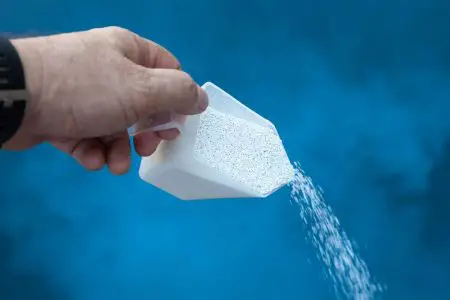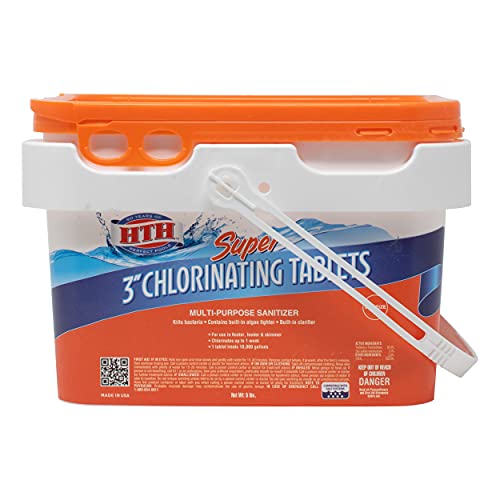If you are putting in a pool, one of the first decisions you need to make is if you want a saltwater pool or a chlorine pool. This guide will walk you through the differences between the two so that you can decide what is best for you.
Chlorine Pools
Why is chlorine needed?
Chlorine is by far the most popular CDC-approved sanitizer for swimming pools. That means it kills bacteria, viruses, fungi, parasites, and all sorts of other things that could make you sick from swimming.
Chlorine also is an oxidizer, meaning it reacts with organic contaminants like sweat and oils.
Lastly, chlorine is also a residual sanitizer that will remain in the pool and continue to sanitize and oxidize well after it is added to the pool.
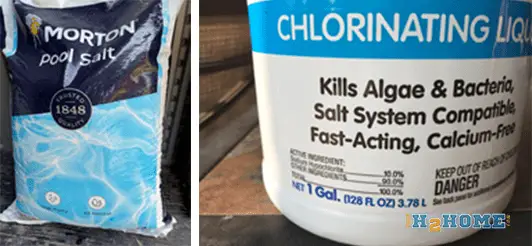
What type of chlorine are available?
Chlorine is available in different forms for your pool, each with advantages and disadvantages.
Liquid Chlorine is my favorite type of chlorine as it is quickly available to your pool and it does not contain some of the additional ingredients of the other forms of chlorine. The main disadvantage is that you have to add the liquid chlorine on a more frequent basis than some of the other forms of chlorine.
Trichlor is the most commonly used type of pool chlorine in residential pools. The active ingredient is Trichloro-S-Triazinetrione, which is a stabilized form of chlorine that is commonly sold in 3-inch pucks, 1-inch tablets, and powdered shock.
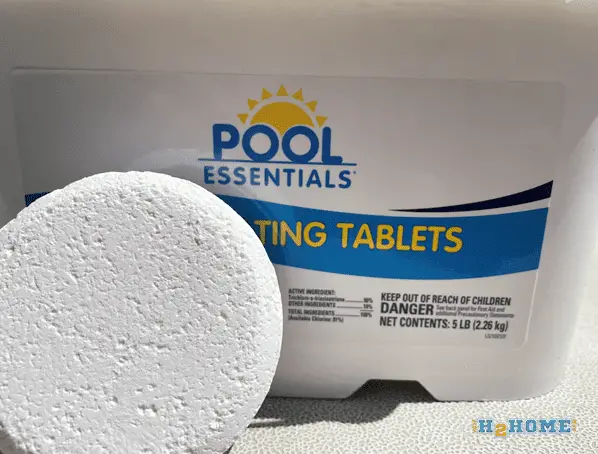
The appeal of trichlor is the convenience of adding the trichlor to your pool via an automatic chlorinator, floating dispenser, or the skimmer. The main disadvantage is that they contain stabilizer or CYA, which can build up in your pool over time and require more and more chlorine to keep an appropriate level of sanitizer in your pool.
- BENEFITS: Sanitizes and protects your pool water so you can enjoy swimming...
- USE: Place a tab in pool skimmer, floater, or feeder for simple, DIY pool...
- COMPATIBILITY: Vinyl-lined pools and saltwater systems
- FEATURES: Kills bacteria and algae; Chlorinates for up to 1 week; Clarifies...
- INCLUDES: One 5-lb container of Super Chlorinating Tablets for swimming...
Cal Hypo, or Calcium Hypochlorite, is most commonly sold in powdered shock form. It does not contain stabilizer like trichlor, but it contains calcium which can also build up over time in your water and cause white scaling if not managed properly.
Other less popular methods to chlorinate your pool include using chlorine gas, which should be left to the professionals and is a rare service to find still in use, but there are a few places that still use this method.
Advantages of a Chlorine Pool
Chlorine pools are the most popular type of residential swimming pool with a wide variety of ways to chlorinate your pool. Pool chlorine can be easily found at pool stores, hardware stores, and many big-box retailers across the country.
Disadvantages of a Chlorine Pool
I hear many people discuss the fears of chlorine including it being irritating to the eyes and with a strong odor. I cannot chalk those up to the chlorine itself as those symptoms are typically related to pools where the pH is off, or the result of high Combined Chlorine, which results from the chlorine fighting contaminants.
To me, the biggest disadvantage to chlorine pools is the overuse of pucks and powdered shock leave behind CYA/stabilizer or calcium. Each of those products can build up in your water and lead to problems down the road if not properly managed.
Saltwater Pools
What exactly is a saltwater pool?
Quite simply put, a saltwater pool makes its own chlorine. If you think back to your high school chemistry days, you will remember that salt is NaCl which is Sodium + Chlorine.
Saltwater pools use a piece of equipment to break up the salt molecules so that the chlorine can be used to sanitize your pool.
How is that different than a chlorine pool?
The chlorine part is not much different between a traditional chlorine pool and a saltwater pool. The chlorine in both pool types sanitize and oxidize your pool water to keep it free from algae, bacteria, viruses, and other contaminants.
Obviously, saltwater pools have salt in them. Your equipment will dictate your target salt level, but generally, your salt target level will be about 3,000 ppm. I find that most people cannot taste the salt in saltwater pools at those levels.
By comparison, human tears are over twice as salty at 7,000 ppm and seawater is a whopping 10 times lower than seawater at 30,000 ppm.
Saltwater Chlorine Generators (SWCG)
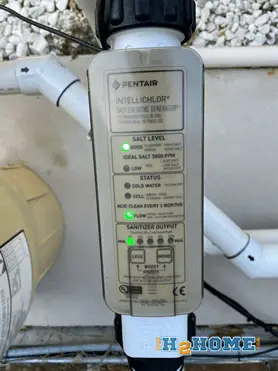
The SWCG is where the magic happens in a saltwater pool. As your pool water, including the dissolved salt, pass through your pool equipment the SWCG uses electrolysis to separate the chlorine and let it sanitize your pool water just like if you added chlorine.
Adjusting your saltwater pool
I think the true beauty of a saltwater pool is the ease in adjusting your pool chlorine levels, especially with all of the modernization of pool equipment to allow it to be controlled from your phone or other mobile devices.
Most SWCG’s allow you to control the output in terms of percentage of runtime. A SWCG set at 100% runs all of the time, where one set to 20% only runs 20% of the time.
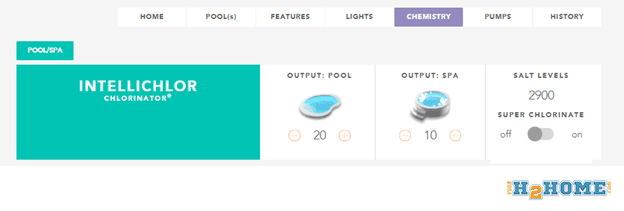
Pump runtime is also a factor to consider for your SWCG. Your SWCG can only generate chlorine when the pump is on so generally longer pump run times are necessary with a SWCG.
- GENERATES CHLORINE FROM SALT – The MegaChlor spa and above ground pool...
- GENTLE ON EYES AND SKIN – The electrolysis process produces chlorine from...
- SIMPLIFIES POOL MAINTENANCE – The self-cleaning reverse polarity system...
- EASY TO INSTALL AND USE – The MegaChlor plug-and-play system does not...
- MADE IN THE USA – All ControlOMatic products are made in the USA and come...
Maintenance
The only maintenance difference between a saltwater and chlorine pool is going to be the maintenance of your SWCG.
I generally recommend inspecting the SWCG at the beginning and end of each swim season. If there is calcium buildup that appears inside of your SWCG, follow your manufacturer’s instructions but generally involve gently removing the calcium buildup and using a diluted solution of muriatic acid to dissolve the calcium.
The life span of a SWCG is generally 4-7 years with proper maintenance. After that, you will need to replace the SWCG cell with a new one.
Choosing a Saltwater Chlorine Generator (SWCG)
I recommend looking at two main factors when choosing your SWCG.
The first factor is the brand. The general rule of thumb is that equipment from the same manufacturer “talks” better to each other if they are from the same manufacturer, especially if you have an automation system. If you do not have automation, you have more flexibility to choose the brand of SWCG.
The second factor is the pool sizing for your SWCG. Most SWCGs have a rating of Up to x number of gallons.
The keyword here is Up to, and if you are close to the upper limits of your SWCG that means you will be running the pump longer and at higher percentages. I recommend choosing a SWCG that is rated for at least 1.5 times the size of your pool or even twice the size of your pool to give you more flexibility on your runtime and % output.
Testing for Salt
When you have a saltwater pool, I recommend buying a test kit so you can properly maintain your salinity level like this one:
- Taylor Technologies K-1766 Salt Water Kit is for use with salt water...
- Country of Origin: United States
- Brand Name: TAYLOR TECHNOLOGIES INC
- Model Number: K-1766
Saltwater Advantages
The biggest advantage I see in a saltwater pool is the ease in maintaining your pool since the SWCG does the job of adding chlorine for you. That means you could go on vacation for a month and not have to worry about adding chlorine to your pool.
Some people report a better feeling of the water, especially a silky feeling once you get out of the water.
I also like that you have the luxury of providing a constant source of chlorine to your pool instead of the ups and downs you see when manually adding chlorine to your pool.
Saltwater Disadvantages
If you ask someone the biggest disadvantage of a saltwater pool the number 1 answer is corrosion. I have not seen an impact to equipment or stone on saltwater vs what you will get in a chlorine pool, but I wanted to note that you will see and hear that during your research.
To me, the biggest disadvantage of a saltwater pool is the purchase of the SWCG as that can be $1,500+ and have to be replaced every 5 or so years.
Another disadvantage is that SWCGs do not work well in cold water and will shut off if the water gets too cold requiring you to add chlorine during those times.
Lastly, a SWCG requires that your pump be running for hours a day to produce chlorine. For many people with energy-efficient pumps, the pump runtime is of little concern, but if you have a single-speed energy hog you may not like having to run your pump for longer periods to produce the chlorine your pool needs.
Equipment Differences Between Saltwater and Chlorine Pools
I hear a lot of misinformation regarding equipment in saltwater and chlorine pools. The only difference in the equipment is that saltwater pools require the SWCG.
The only other difference is that most chlorine pools have an inline chlorinator, but you can also add those to saltwater pools in climates where you need to add chlorine to the water in the winter.
Pool pumps, filters, heaters, cleaners, and other equipment should be the same between the two types of pools. As always, check with your equipment manufacturers before finalizing any decisions.
FAQ – Chlorine vs. Saltwater Pools
Can I avoid chlorine by going with a saltwater pool?
Answer: No. Both types of pools utilize chlorine to keep your pool safe and free from algae, viruses, bacteria, etc.
Can I switch to a saltwater pool if I have a chlorine pool?
Answer: Yes. You can add a SWCG to your equipment. Typically you want to add it to a straight section of your equipment after the water leaves the filter and heater.
Can I switch to a chlorine pool from saltwater?
Answer: Yes. Many times people switch to a chlorine pool when their SWCG quits working to avoid the replacement costs of a new one. Many equipment manufacturers sell dummy cells that screw into the unions of your SWCG for an easy swap out that does not require any cutting of pipe. As for the salt, most people like the feel of the salt in the water, but if you have too much salt the only way to get rid of it is to drain a portion of your pool and replace it with fresh water.
Do I have to add salt as it gets used up in my pool?
Answer: Not exactly. It is a common myth that the salt gets used up by the SWCG, which is not the case as the salt remains in your pool until it is splashed out or backwashed out of your pool.
What type of salt do I use in my pool?
Answer: Generally salt is salt. Pool stores and some hardware stores sell fine-grained pool salt that is fast dissolving, but larger water softener salt pellets will work just fine. The key is to look at the ingredients and make sure there are no additives and that it is pure salt.
How do I add salt to my pool?
Answer: I recommend adding the salt to the deep end of your pool, then use your brush or pool cleaner to stir around the salt until it dissolves. Also during this time, you should turn off your SWCG by putting it at 0% to prevent damage to the unit.
Are there other types of pools?
Answer: Yes. The main alternative to chlorine and salt is bromine, which is EPA approved for pool sanitation and has similar residual sanitation effects as chlorine. Ozone and UV can be used to disinfect pool water, but only disinfect the water as it passes through the device so supplemental chlorine is required for the residual sanitation.
Will a saltwater pool feel like swimming in the ocean?
Answer: No, seawater is 10x more saline than a saltwater pool kept at 3,000 ppm. At that level, some people may be able to taste the salt, but others cannot. I cannot taste it until about 3,200 ppm and even then it is a very slight hint of salt.
Does my chlorine pool contain salt?
Answer: Yes. Salt is a byproduct of chlorine so your chlorine pool does contain salt. Ranges vary from pool to pool but some can have almost as much salt as a saltwater pool. If you are switching to a salt pool, you should always test your salt before adding salt.
Which type of pool is cheaper?
Answer: There is no clear-cut winner here. In general, the saltwater pool expenses are upfront when purchasing the SWCG, while a chlorine pool is more of a constant expense. By my math, a $1,500 SWCG that lasts for 5 years ($300/year) is going to be about the same that you spend on chlorine for that period.
Conclusion
A chlorine or saltwater pool is a personal decision and there is no right answer. Saltwater pools can offer convenience, but with upfront costs. You have to look at upfront costs, climate, pump type, and level of involvement in your pool.
I live in a warm climate, with a VS pump, automation, I’m tinkering with my pool daily and love my saltwater pool.
Someone with a single-speed pump, no automation, and in a different climate may not get the same advantages and a chlorine pool may be best for them. The same goes for someone who is going to be hands-off with their pool maintenance and have a company maintain their pool.
Hopefully, this guide helps people make an important decision with their pool. More importantly, you should remember that you can have a great pool regardless of your decision of chlorine vs. salt.

I am passionate about taking care of pools and started over 20 years ago as a young entrepreneur taking care of several neighbor’s pools in the Houston, TX area. Now I live in Prosper, TX, and am known as the Prosper Pool Consultant:
I specialize in solving short-term pool issues with the goal of educating that customer so that they never need my services in the future. It is a unique business model, but I find it very rewarding to see pool owners gain the confidence and tools to manage their pools themselves.
